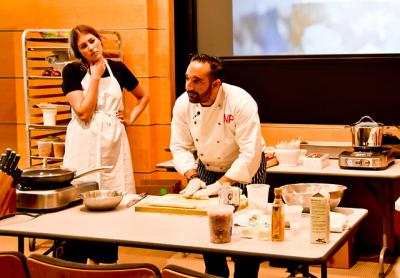Food Lab Conference Brought the World to Southampton

Diversity and a global perspective that reflected back on the East End were the emphasis of this year’s Food Lab conference, held over the weekend at Stony Brook Southampton’s campus.
The conference began with a Greek cooking class on Friday and ended with a discussion of how winemaking traditions tie together countries and continents. In between, there were receptions, breakfast, lunch, and a small tasting plates dinner of international dishes inspired by recipes from recent immigrants.
Through it all, health and access to nutritious food were a compelling and constant theme linking many of the sessions.
Nicholas Poulmentis, a winner on the Food Network’s series “Chopped,” provided a demonstration and detailed instructions on how to make updated and mostly healthy versions of classic Greek food such as spinach pie, meatless keftedes or meatballs, and goat cheese gnocchi with a not-so-healthy creamy bacon sauce. The keftedes were made with lentils and bulgar wheat and served on romaine lettuce with a squeeze of lemon. While he cooked, assistants passed his dishes into the audience, where people also sampled Greek wines as they watched the action. The two-hour class gave participants a chance to ask questions during the preparations and they received tips such as how to store olive oil and reduce a cream sauce.
The next day, Mr. Poulmentis reappeared for a panel titled “Nourishing Diversity: Our Social, Emotional, and Spiritual Relationships With Food” with four other panelists and Paula Gilovich, a well-focused and organized moderator. He spoke about his youth in Greece and the cooking, fishing, and other food gathering he did with his father and how he still tries to import the ingredients he misses from home.
Carolina Santos-Neves, another panelist, described her childhood in Brazil and Mexico and the way she has used food to bring people of many different cultures together, both through her work as a chef and the meals she prepares at home for crowds of new and old friends.
Mohammad Modarres, the founder of Interfaith Ventures and Abe’s Meats, discussed his odyssey in developing products and programs that encourage interfaith dialogue, particularly between Muslims and Jews. His efforts have culminated in Shabbat Salaam, dinners featuring meat that has been processed under the most devout religious standards of both faiths.
It took a long time and it wasn’t easy. “The first couple of religious leaders said ‘absolutely not, this needs to be kept separate,’ but that kind of emotion pulls you forward. It makes you want to cause some trouble.” Bringing the two groups together to break bread has fostered a sense of commonality. “The talk around the table becomes about how expensive day care is,” he said, not religious differences.
In the same panel Josephine Smith, the director of cultural resources for the Shinnecock Indian Nation, recalled foraging for wild grapes, blackberries, and blueberries on the reservation. Although she still can, “they’re not as plentiful, choked out by invasive species” and home building as the population has increased over time.
The reservation once had acres of land planted with corn, squash, and beans, but now there is only an 18-by-10-foot community garden plot, she said, and the waters are affected by nitrogen-loading and other issues connected with regional development. Although the tribe would like to achieve “food sovereignty,” i.e., produce its own food on a scale to become self-sufficient, its goals are limited by the available land on the reservation today. She said the tribe lost 4,000 acres in the 19th century to the state in falsified documents and now its fishing rights are also being challenged. “Where can we have land for farming and livestock when our homes are already so close together?” she asked.
In the following panel, Frank Lipman, a South African-born doctor who favors an integrated and functional approach to medicine over traditional Western medicine that works only to cure specific illnesses, compared notes with Shawn Cannon, who runs Stony Brook Southampton Hospital’s residency and fellowship programs. Both agreed many of Americans’ health problems — which they said stem from inflammation and poor diets high in processed foods — are not being properly addressed.
Quoting the author Wendell Berry, Dr. Lipman said “the food industry pays no attention to our health, and the health industry pays no attention to our food.”
Dr. Cannon says he sees the interest and dedication to a whole body approach to medicine in his millennial-age students. Yet, the information they need for such a practice won’t be found on any medical board tests, which discourages further study. As a result, patients often must pursue this type of wellness-based health care on their own, if they are even aware of it.
